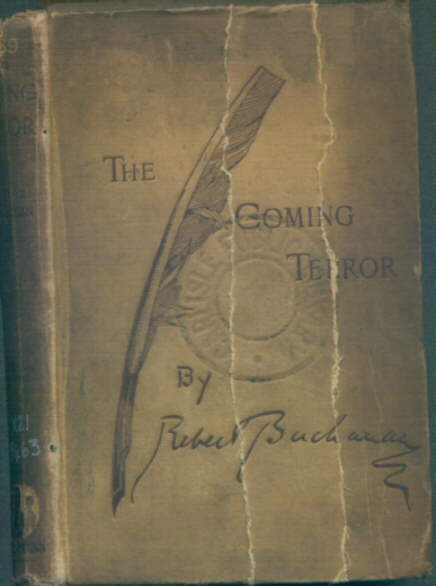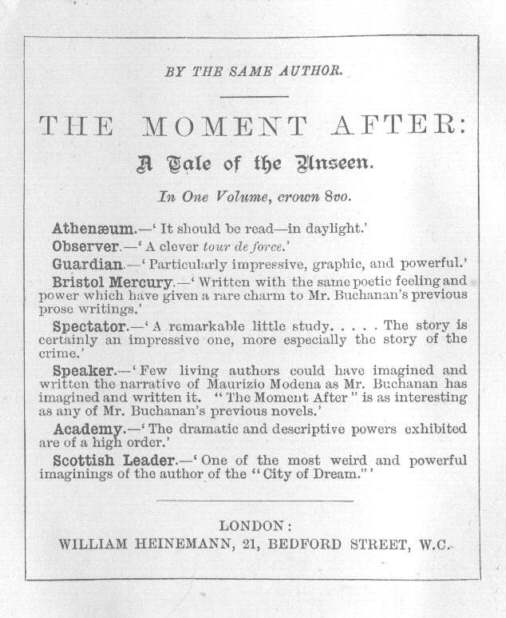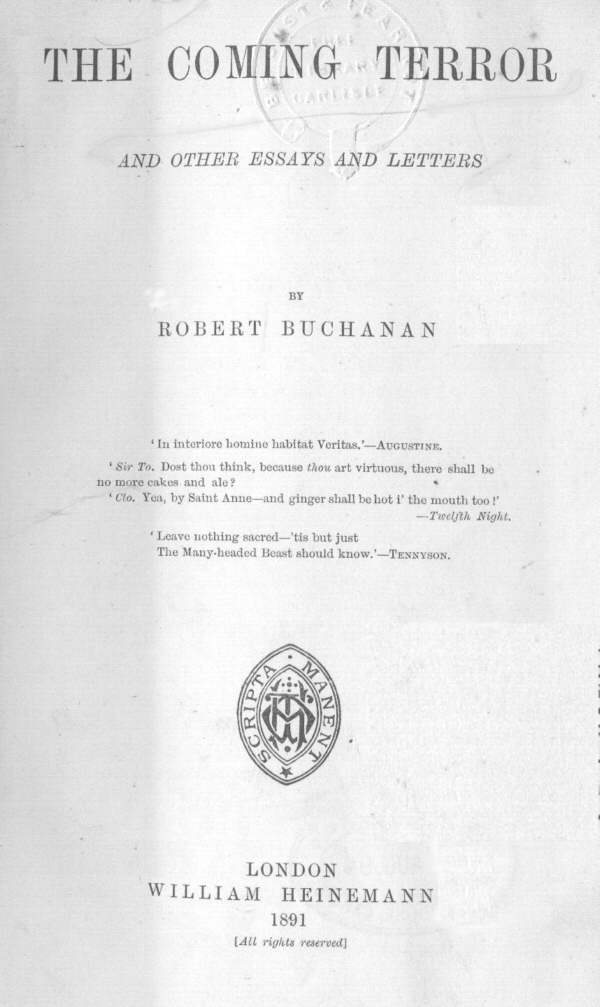|
THE COMING TERROR
AND OTHER ESSAYS AND LETTERS
BY
ROBERT BUCHANAN
‘In interiore homine habitat Veritas.’—AUGUSTINE.
‘Sir To. Dost thou think, because thou art virtuous, there shall be
no more cakes and ale?
‘Clo. Yea, by Saint Anne—and ginger shall be hot i’ the mouth too!’
—Twelfth Night.
‘Leave nothing sacred—’tis but just
The Many-headed Beast should know.’—TENNYSON.
LONDON
WILLIAM HEINEMANN
1891
[All rights reserved]
_____
v
PREFACE.
_____
I MUST apologize to the serious reader for preserving, in the present permanent form, at the request of many correspondents, the following passing comments on public events and social phenomena. My aim is selfish, yet twofold. Firstly, these comments may be useful by-and-by to readers of my less desultory contributions to literature; secondly, I am enabled, in republishing them, to restore one or two passages which were too outspoken for the columns of the daily newspaper of the period.
From the first moment I began to write I have been endeavouring to vindicate the freedom of human Personality, the equality of the sexes, and the right of Revolt against arbitrary social laws conflicting with the happiness of human nature. Had I paused there, I might have secured the suffrages of a friendly minority. But, unfortunately, while defending Freedom on the one hand, I have been defending Society on the other, under the impression that social organization is not always, and not necessarily, tyrannical. From my point of view, the average Home is not invariably (what the gentlemen of the Hall of Science describe it to be) a ‘Harem,’ nor is the average Morality inextricably associated with ‘the piggish virtues of the Georges.’ I am, therefore, out of harmony with the minority as well as with the majority, and am little likely to find favour with either party: either the Conventionalists vi who assume that everything existing is right, or the Reformers who believe that everything existing is wrong.
At this moment of publication a great wave of Mock-Morality is threatening to destroy much that is beautiful and pleasurable in Life, in Literature, and in Art. Nearly every natural function, certainly every natural enjoyment, has been arraigned as criminal, and the vice of incontinence in matters of the Body has been confused, by the blind leading the blind, with the passion for freedom in matters of the Soul. Not for the first time in the history of the world, Man has discovered that he is naked. So ashamed is he of his unclad organism, that he is content to adopt any kind of hypocrisy as a garment. The ulcerous rags of Asceticism, the dingy cloak of Pessimism, the tin-drawers sanctioned by the Vatican, the cheap slop-suit of current Socialism, and the quasi-military breeches adopted by the Salvation Army, have all been found acceptable, even necessary; for if any idea is established among philanthropists nowadays, it is that Man is naturally an indecent animal, and that his propensities are, of necessity, brutal. This idea is dominant not only in circles professedly puritan, but in circles professedly free and eclectic, for the Calvinistic preacher and the advanced Moral Reformer are agreed at least on one point, that the World is ugly, and that Man is a Beast. Hence the new Gospel of Total Abstinence from the Beautiful and the Enjoyable; hence the creed that all conduct, all emotion, all Life, all Literature, all Art, must have its sanction from the scientific discovery without, not from the conscience within; hence certain unnatural ordinances of Marriage and Divorce, the restriction on all true freedom of Relation between the sexes, the licensing laws, the inquisitorial Councils, the new Journalistic Police, the death of free Literature, and the paralysis of free Art. Instead of sunshine and fresh air, Humanity accepts the Dingy Science in excelsis; in lieu of a God proved to be vii non-existent or paralytic, it clamours round its Providence made Easy.
County Councils, Vigilance Associations, Arbitrary Trades-unions, the new Science of Self-Exposure, and the new Literature of sexual pathology, are all but steps on the way to the dreary millennium of State Socialism, to the period of the greatest Tyranny of the greatest Number. Every institution, however peaceful, however beautiful, is to be destroyed and trampled down under the hob-nailed boots of Demos. Intellectual activity itself will soon be regarded as a dangerous form of Competition! What the world will become when the State superintends all living functions and governs all living acts may be gathered from the direful prophecy of social nullity painted, with blind and misplaced enthusiasm, in a book called ‘Looking Backward.’ Is it to be wondered at that so many men, dreading the catastrophe, turn Tories in despair?
The main contention in the following pages is that no amount of political or social tinkering will complete the process Nature chooses to work out by her own slow methods of conscientious evolution, and that, by the present growth of quasi-providential restriction, by the emergence of Mob Morality and Mob Rule, those sublime methods are being indefinitely retarded, even occasionally reversed. In proportion as we limit the freedom of the Individual, we retard the progress of the Race, destroy human character, debase human intelligence, and arrest the development of the social conscience. Sanitation in both the physical and the moral world comes of free oxygen, free sunshine, and free exercise. Knowledge comes of personal experience and suffering, not of political or moral dogmas, all hollow as the dogmas of any and every Church. In a word, no organization of human beings, no union, secular, priestly, or apostolic, can help one man to ‘save his Soul alive,’ or, what is the same thing, to save the Souls of those he loves.
The glory of the Age is its recognition of the responsibilities viii of human Brotherhood; the disgrace of the Age is its attempt to confuse philanthropy with tyrannous legislation. Seen from the standpoint of common justice, our present condition of Society is one actively stirred, in every fibre, by the science of Humanity. Ways and means may differ, but Tory and Liberal alike are striving, and not ineffectively, for the common good. If the balance of private philanthropy and beneficence were to be ascertained even now, it would be found, perhaps, that the weight of ‘good works’ was on the side of those who are trying to conserve whatever is just and noble in our constitution; that in all matters of private tolerance and kindliness to human beings in the mass, the Tory was more generous than the Liberal, and the Liberal more sympathetic than the Radical. The old feudal system itself was wiser, and far pleasanter, than the new Despotic Socialism. The last scientific and political Providence, like the old Christianity, postulates an utterly non-existent and absolutely unreal Human Nature; it legislates for men and women as they never were, and demands a perfection of obedience which would convert them into moral parasites. Men grow by happiness and freedom, by the exercise of every natural function; men dwindle when they become merely portions of a Political Mechanism. The result of Socialistic Legislation is seen nowadays in a thousand disastrous forms some of which I have endeavoured to describe in the following pages; while, on the other hand, I have not been afraid, at the risk of seeming inconsistent, to point out the folly of anti-social forms of Individualism, forms which show the Individual anatomising his own morbid secretions, parading his own obscene discoveries, shutting out the common sunlight, and finding in Nature only the Calvinistic phenomena of Darkness, Disease, and Death.
R. B.
_____
ix
CONTENTS.
_____
PAGE
THE COMING TERROR: A DIALOGUE BETWEEN ALIENATUS, A
PROVINCIAL, AND URBANUS, A COCKNEY 1
ARE MEN BORN FREE AND EQUAL? A CONTROVERSY 41
ON DESCENDING INTO HELL: A PROTEST AGAINST OVER-
LEGISLATION IN MATTERS LITERARY 99
THE MODERN YOUNG MAN AS CRITIC 143
IS CHIVALRY STILL POSSIBLE? 183
IMPERIAL COCKNEYDOM 225
IS THE MARRIAGE CONTRACT ETERNAL? 259
FLOTSAM AND JETSAM:
I. WHAT IS SENTIMENT? 289
II. EMMA WADE’S MARTYRDOM 297
III. THE APOTHEOSIS OF THE GALLOWS 302
IV. THE DEFEAT OF THE TOTAL ABSTAINER 308
V. THE CARNIVAL OF ROBERT BURNS 313
VI. BENEFICENT ‘MURDER’ (1) 319
VII. BENEFICENT ‘MURDER’ (2) 324
VIII. BOOKSELLERS’ ROMANCE 331
IX. PROFESSOR HUXLEY’S MIRACULOUS CONVERSION (1) 336
X. PROFESSOR HUXLEY’S MIRACULOUS CONVERSION (2) 342
XI. ‘THE JOURNALIST IN ABSOLUTION’ 349
XII. THE COURTESAN ON THE STAGE 354
XIII. GOETHE AND CRITICISM 357
XIV. ‘DRAMATIC CRITICISM AS SHE IS WROTE’ 358
FINAL WORDS:
I. THE PARADOX 363
II. THE SOCIAL SANCTION 368
III. THE OUTCOME IN MINOR LITERARY CRITICISM 370
IV. TYPES OF EGOISMUS 374
V. ‘MORALITY’ AS LITERATURE 376
VI. THE OUTCOME IN IDEALISM 381
VII. ‘POOR HUMANITY’ 383
_____
NOTE TO THE SECOND EDITION.
_____
SCARCELY is ‘The Coming Terror’ issued to the world than a Second Edition is called for—which is satisfactory enough, as showing that even the trades-union of Criticism cannot quite kill an outspoken book by a non-union man. Here and there, indeed, to my astonishment, the work has received words of actual approval, qualified, of course, with a suggestion that it need not be taken quite seriously; but, as I write, the good old three-decker newspapers are beginning to take listless aim with their heavy guns at my cockle-shell. The Times sends a sleepy projectile, which falls, as usual, far short of the mark; the good old ship Observer deigns to fire a random and rusty shot, while thundering heavily and internally about ‘gospel according to Buchanan’ and ‘angry philippics’; and The Speaker, a new boat of the top-heavy species, tries to run down the cockle-shell on the score that the conduct of its pilot if ‘ungentlemanly.’ Altogether, I have to congratulate myself on a fair measure of old-fashioned abuse. To have been saluted amicably by the Wooden Walls of Cockneydom would have been proof positive that my little vessel contained nothing but sailing orders for the lumbering Literary Fleet and complimentary messages from Headquarters to the blundering gentlemen in command.
I resent only one imputation,—that I have written, and write, ‘in a temper.’ If it were true, it would not be surprising, but it is, in point of fact, not true at all. I am, let me assure my critics, a singularly calm person, and if I aim at a whole Fleet of leaky vessels, it is quite coolly and good-humouredly. I know, quite as well as my severest censor, that I am fighting against heavy odds, with no chance whatever of winning the battle. I know that War, Prostitution, Providential Legislation, the New Journalism, the New Morality, will fling out their bunting long after I am sunk and drowned. I know that I shall be shot in the back, beaten down, swarmed over, and generally overcome, by the conventional Marines. Après? I am rather amused than angry. ‘Woe to you when the world speaks well of you,’ says the prophet.
I must warn my readers, however, against one particular method of the enemy—the method christened by Charles Reade ‘the sham sample swindle.’ By quoting some of my phrases without their context, one or two of my critics have attempted to show that I am hostile and unjust to everybody,—that I call Zola ‘a dullard,’ denounce Tolstoi, and side with Philistia against other great personalities. Readers of this book will discover how far and how earnestly I justify the very men I am accused of decrying, and a reference to contemporary chronicles will further establish the fact that I alone, among English authors, have demanded, even for the writers with whom I disagree, perfect liberty of literary expression.
Since much of my complaint is against Journalism as at present conducted, I can expect little or no mercy from that quarter; and I ask for none. What the Roman Catholic Church was for many centuries, what the Protestant Church became during the period of its decadence, the Church of Journalism is to the present generation,—shallow, dogmatical, cruel, and inquisitorial. To secure its praise and sympathy, means both moral and intellectual degradation. Yet, as the reader is aware, I have not been slow to avail myself of its pulpits, and entering its temples, to denounce its own temporizers and money-changers, to be denounced in turn as a dreamer and a madman. I am possibly the one, and certainly the other; for I still believe in the strange gods whose marble images bestrew the world, and I still look upward to the heavens, not downward to the drains, for the Light which is Life.
That ‘The Coming Terror’ is a Jeremiad and not a gospel, may at once be admitted. Yet Jeremiah was, in his small way, a gospeller as well as a prophet. He endured ‘reproach and derision daily,’ his townsmen of Anathoth threatened to slay him if he did not cease exposing abuses, and even his own family ‘dealt treacherously’ with him. The same fate awaits every man who fails to flatter authorities, or who reminds society of its follies and its imperfections. Even Thackeray, elegantly preaching the Gospel according to St. Jeames, was described by the superfine Reviewer of his period as ‘no gentleman.’
ROBERT BUCHANAN.
April 20th, 1891.
_____
Reviews of The Coming Terror
Back to Essays
|


